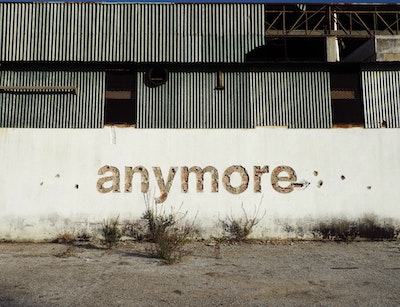Any more vs. Anymore: A brief history.
In this article, we will look at the two-word phrase any more which, in certain situations, becomes the one-word phrase, anymore.
The phrase any more began as two words and, over time, developed separate spellings and, in most cases, separate meanings, as well.
Historically, the phrase any more can be traced to the Middle English phrase, ani more (1350–1400), meaning any longer. In almost all English-speaking countries around the world, any more is the default. American English is the exception; the single word anymore seems to be the most common spelling in the US. Over the last 50 years or so, we can see changes occurring in published English, where a distinction has been made between the one and two-word forms.

Let’s look at the two-word phrase any more.
In grammar, any more is used as a type of determiner called a quantifier, which indicates an unspecified quantity of people, places, or things.
How is any more used in a sentence?
• The words any more can be used with certain negative words, including the following: hardly, never, scarcely, and doesn’t. For example: “There are hardly any more sandwiches left on the tray. “He doesn’t want any more communication with them. ““They are never together any more.”
• The words any more are almost always used in negative statements and questions as opposed to the words some more, which are more often used in similar but affirmative questions and statements.
For example:“I don’t have any more friends in this town,” is a correct, negative sentence. “I don’t have some more friends in this town,” is an incorrect, affirmative sentence. Similarly, you could write, “I would like to make some more friends” whereas, you would not write, “I would like to make any more friends.”
• The words any more can be used in sentences together with the word if. For example, “If you find any more books, I would be happy to take them to school.”
• The words any more can be used with an adjective. For example, “He couldn’t have looked any more handsome in his white jacket.”
• The words any more can be used with a noun. For example, “Would you like any more pasta?”
• The words any more can be used as two separate words with two separate functions. For example, “It doesn’t get any more extreme than thunderstorms in Florida!” In this example, more is a modifier for the adjective extreme, so any cannot be attached to it and needs to be a separate word.
Now, let’s look at the one-word phrase anymore.
The word any more is used as an adverb, referring to time. It typically depicts something that happened in the past but is not happening at present. It is a negative statement or question and is often placed at the end of a sentence.
For example: “I do not intend to drive at night anymore.” “Why doesn’t he visit anymore?” "I don’t want to be here anymore.”(In most English-speaking countries, except the USA, the two-word phrase any more can be used as an adverb, as well.)
The following words are synonyms for the word anymore: for the time being, still, any longer, or to any further extent
• In American English, the word anymore is sometimes used to mean nowadays, such as, “The rent in the city is unbelievable anymore.” But be cautious. Outside of the United States, this usage is usually considered incorrect.
More examples of one and two-word phrases where both forms are used in everyday spelling but each has a different meaning:
Every day vs. Everyday
Every day describes frequency; it means the same as “each day.”
Everyday describes something ordinary; it means the same as “commonplace.”
All together vs. Altogether
All together describes things that are united.
Altogether means “completely.”
Get away vs. Getaway
Get away means to leave or escape something or someone.
Getaway describes the act of getting away.
You have probably seen a million words that behave in this manner, and you will surely notice many examples after reading this article. Now you know when to use the two-word form and when to use the one-word form. Confusing? Yes. But don’t worry.You can play it safe by using this simple tip:
When in doubt, choose the two-word any more as your default. It is almost always acceptable, any time and any where anywhere.








Have a discussion about this article with the community:
Report Comment
We're doing our best to make sure our content is useful, accurate and safe.
If by any chance you spot an inappropriate comment while navigating through our website please use this form to let us know, and we'll take care of it shortly.
Attachment
You need to be logged in to favorite.
Log In